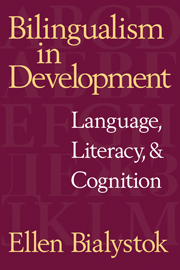7 - Beyond Language
Published online by Cambridge University Press: 02 December 2009
Summary
Several years ago, newspapers screamed out headlines announcing that playing Mozart to infants was shown to improve their performance on cognitive tasks (Rauscher, Shaw, & Ky, 1993). This magic bullet was pounced on with almost the enthusiasm that would be expected to accompany such windfalls as a map leading straight to the Fountain of Youth. It was even reported that hospitals were providing Mozart tapes to new mothers, along with samples of diapers and infant formula. The subsequent debunking and advised caution were displayed less prominently in the press (Nantais & Schellenberg, 1999). The idea that a simple and relatively common activity could significantly alter the intelligence of our children tapped into something deeply motivating in our middle-class psyches.
Bilingualism has also been considered a candidate for an experience that propels children's intelligence into a new stratum. At various times and places, teaching languages to children has been touted as beneficial because it nurtured cultural grooming (French), mathematical precision (Latin), or historical and literary sensibility (Greek). These were the official explanations for imparting languages to youth, but they all contributed to the creation of what would have been called a more “intelligent” child. Ironically, the recipients of these educational dictates were children of the privileged, and no small part of the underlying motivation was to perpetuate that privilege. If any general intellectual consequence came from the simple fact of learning another language (as opposed to specific outcomes, like learning French so one could travel abroad), it was not explicitly discussed.
Information
- Type
- Chapter
- Information
- Bilingualism in DevelopmentLanguage, Literacy, and Cognition, pp. 182 - 218Publisher: Cambridge University PressPrint publication year: 2001
